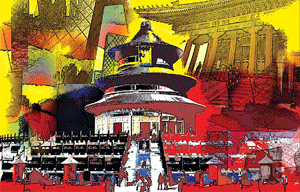Unleashing his pen by untying his tongue
Updated: 2011-10-28 08:06
By Liu Jun (China Daily)
|
|||||||||
Alai's voyage to become the best-known Tibetan author was anything but smooth sailing - especially navigating the choppy waters of writing outside his mother tongue.
Literature became fashionable in China in the early 1980s. Alai then delved into classics penned by such star scribes as Hemingway and Tolstoy while studying tractor driving before he became a middle school teacher.
Alai had never studied written Tibetan. He was born in 1959 in rural Sichuan province, where the Tibetan dialect is unlike the standard Lhasa parlance.
He grappled with the question of which tongue in which to pen his works.
Alai recalls feeling befuddled when he participated in an amateur writers' workshop in the early 1980s.
The discussions exclusively focused on literature's political meanings. Alai raised eyebrows when he told the group, "That can't be right."
A local celebrity author retorted by challenging him to write something. Alai stayed late into the night, penning the prose of his first Chinese-language poem.
The soft-spoken Sichuan Writers' Association chairman says he can't recall the work's content but remembers it garnered praise.
After much pondering, he settled on authoring his works in Chinese.
He poured his energy into Red Poppies, a book based on legends from his hometown. Publishers rejected the novel for four years before it became a best-seller translated into 16 languages.
His other major works include Hollow Mountains (Kong Shan) and King Gesar.











